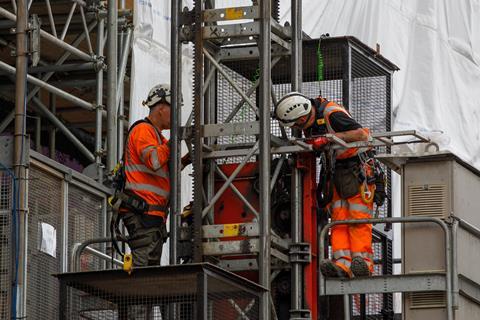Industry bodies and the Centre for Social Justice warn shortage of workers poses threat to government’s 1.5 million homes target
The construction workforce has fallen to its lowest proportion of total UK employment in over 100 years, according to new research by the Centre for Social Justice (CSJ).

The thinktank has released a report titled ‘Skills to Build: Fixing Britain’s construction workforce crisis,’ which seeks to address the challenges underpinning the industry’s workforce shortage through 26 recommendations to government.
The report, which includes voices and insight from across the sector, highlights obstacles such as an ageing workforce, the covid-19 pandemic and Brexit, which have slashed the number of builders by thousands over the past decade.
It argues this poses a serious threat to the government’s aim to build 1.5 million homes by the end of this parliament, which will require an additional 161,000 workers, rising to over 239,000 when factoring in wider projected demand by 2030, according to recent analysis from the Construction Industry Training Board (CITB).
Among other recommendations, the CSJ said the Department of Education and CITB should consult on reforming the training levy to enable a wider range of organisations to access levy funds, including labour agencies that wish to take responsibility for training and self-employed workers seeking to upskill.
It also calls for the streamlining of planning processes to strengthen employer security, including requiring local planning authorities to automatically approve applications when they comply with a locally adopted design code, except where specific, pre-defined exclusions apply.
Timothy Wates, trustee at the Wates Family Enterprise Trust, said the report “provides a roadmap for recruiting the next generation of builders - the carpenters, roofers, bricklayers and plumbers who are essential to our nation’s future prosperity”.
Rico Wojtulewicz, head of policy and market insight at the National Federation of Builders, said: “What firms have access to a pipeline of future work is also important. 8 in 10 construction apprentices are trained by SMEs, despite those firms struggling with work pipelines and project certainty for almost two decades. This is the main reason why the construction skills crisis continues to worsen.
“The right way to fix the skills crisis is, therefore, to unblock work pipelines for SMEs. When they had a fuller pipeline, building 40% of homes in the 1980s, they trained more bricklayers and carpenters per year than all construction apprentices today, where they build just 9% of homes.”
Read the CSJ’s full report and list of recommendations here.


























No comments yet